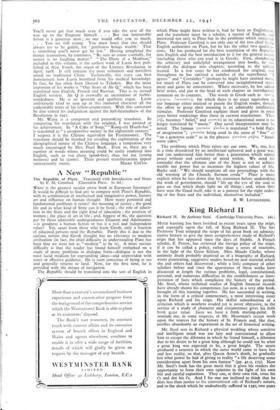A New " Republic "
The Republic of Plato. Translated with Introduction and Notes by F. M. Cornford. (Clarendon Press. 7s. 6d.)
WHAT is the greatest secular prose book in European literature? It would be difficult to find any to compete with Plato's Republic, with its combination of intellectual and imaginative power, literary art and influence on human thought. How many perennial and fundamental problems it raises! the meaning of justice ; the good life and in what kind of State can it be lived ; the role of educa- tion in the State and the right kind of education ; the position of women; the place of art in life ; and, biggest of all, the question put by those admirable undergraduates Glaucon and Adeimantus —is goodness a human fiction or has it a real and independent value? Yet, apart from those who learn Greek, only a fraction of educated persons read the Republic. Partly this is due to the curious notion that Greek thought has no relevance to modern civilisation (in fact, the chief difficulty in understanding Plato has been that we were not as " modern " as he is). A more serious difficulty is that the reader has found himself embarked on a study of many problems in dialogue form—dialogue is not the most lucid medium for expounding ideas—and unprovided with notes or effective guidance. He is soon conscious of being at sea and generally returns to land. Now, for the first time, he is provided with the means of navigation.
The Republic should be translated into the sort of English in
which Plato might have written it, had he been an Englishman, and the translator must be a scholar, a master of English, and interested not only in Plato but in the problems which interested Plato. Professor Cornford -is not only one of the two chief living English authorities on Plato, but he has the other two qualifica-
tions. He has produced far the best translation of the Republic into English and the best introduction to it for the general reader (including those who can read it in Greek). First, abandoning the arbitrary and unhelpful arrangement into books, he has divided the dialogue into chapters, according to the subject treated. In a few cases he has condensed the original, and throughout he has omitted a number of the superfluous " I agrees " and " Certainlys " (perhaps he might have omitted more, for much of Plato can be converted into straightforward state- ment and gains by conversion). Where necessary, he has added brief notes, and put at the head of each chapter an introductory comment on its contents. The words in Greek such as dpE7,, papitris, ■UCW.01:7-111,4, for which there is no exact equivalent in our language either mislead or puzzle the English reader, though the effort to grasp their meaning is an admirable intellectual stimulus. Professor Cornford explains them and gives in some cases better renderings than those in current translations. Thus iot=a becomes " belief," and Aiwa-m.4 in its educational sense is no longer translated by " music." One novel interpretation may be noted. The famous Tivralov OevSos is translated "a bold flight of imagination "; yet, valos being used in the sense of "fine " or " on a generous scale " as in the phrases 7€1,pchas " hand- some cakes."
The problems which Plato raises are our own. We, too, live in a time disordered by an intellectual upheaval and a great war, and can understand him better than a generation which enjoys peace without and certainty of mind within. We need his reminder that the ultimate aim of the State is not to achieve wealth nor power but to incarnate the highest values of life. Burke said: " We should auspicate all our proceedings with the old warning of the Church, Sursum corda." Plato is more explicit when he lays down that his statesmen before undertaking the work of government, should " lift up the eye of the soul to gaze on that which sheds light on all things ; and, when they have seen the Good itself, take it as a pattern for the right order- ing of the State and the individual, themselves included."
R. W. LIVINGSTONE.


























 Previous page
Previous page